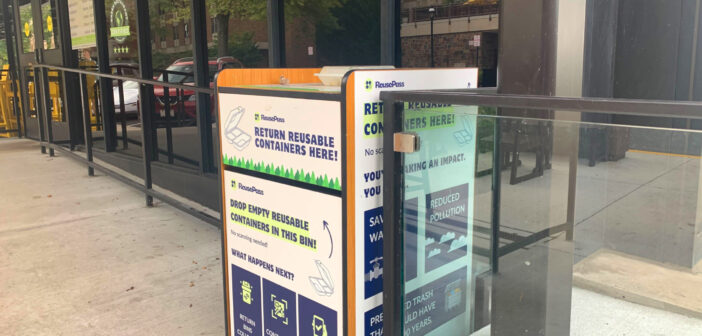Lehigh’s Rathbone Dining Hall received a four-star certification from the Green Restaurant Association this summer, becoming one of 14 universities in the country, and the only one in Pennsylvania, to attain a rating this high.
Every year, the association inspects restaurants and dining facilities and assesses their environmental sustainability. They offer four levels of certification based on eight categories, including energy and water usage, chemicals and pollutants, and waste production.
When Rathbone was last inspected in 2016, it received a level two certification. Resident dining director Joseph Kornafel said the goal was to work towards a higher certification, but the pandemic paused this process.
Jamie Gallant, the university’s sustainability coordinator, joined the dining services team in January 2024 and soon after implemented initiatives to increase the dining hall’s sustainability rating.
He said his work included making overhead lighting more energy-efficient and reducing water use through flow regulators on faucets.
He said Lehigh dining services aim to improve their sustainability each year, and their original goal was three stars. However, with the recent changes — especially those made over the summer — they earned a four-star certification.
The emphasis on sustainability comes from both the university and Sodexo, the company the university contracts for food services.
In 2020, Lehigh implemented its Sustainability Strategic Plan 2030 to “inspire ecologically sound, socially just and financially prudent action that improves the well-being of people and the environment.”
Sodexo also releases a sustainability report each year.
Kornafel said this shared goal has made it easier for the two organizations to work together.
“One thing I love about this partnership between Lehigh and Sodexo is, separate or combined, both have sustainability at the forefront of goals and objectives,” Kornafel said. “We uphold and put our resources from both ends together to collaborate as to what steps are made on this campus.”
While there are several categories in the Green Restaurant Association’s criteria, the food itself has been a key focus at Rathbone.
Erin Foertsch, marketing manager for Lehigh Dining, said both Rathbone and Brodhead Dining Hall source as many food products as they can from local vendors, especially in-season produce and fresh ingredients.
This reduces the dining hall’s carbon footprint by lowering fuel use through shorter transportation distances and makes it easier to ensure the seller uses sustainable processes during production.
Maggie Sobaszek joined Lehigh’s Office of Sustainability as an analyst in March. She has since partnered with Gallant to ensure the food purchased for Rathbone is sustainable and healthy.
Sobaszek also collaborates with students to collect invoices from the dining hall and assess if vendors are ecologically sound, use fair labor, are women or BIPOC owned, and use humane animal care.
“To have a university who really cares about sustainability in their dining operations is amazing,” Sobaszek said. “To then be able to work with students to help them understand more generally about food and the food that we buy is very cool.”
In addition to ensuring sustainable food sources, the dining hall staff tries to reduce waste once the food arrives.
Rathbone uses a data-tracking system called WasteWatch to examine where waste occurs during the food preparation process. Student restaurants manager Scott Glenn said the system has significantly reduced pre-consumer waste since its implementation.
“It’s not about catching anybody doing anything wrong,” Glenn said. “It’s just about finding out where we’re lacking and trying to tighten what we do a little bit.”
Students can also reduce waste by being mindful of their eating habits and making sustainable choices.
ReusePass, a revamped version of the former to-go program, launched at the beginning of the fall semester. It allows students to borrow reusable takeout containers to bring home food from both dining halls.
Foertsch said the containers are designed to replace single-use plastic or styrofoam and reduce the amount of material sent to landfills.
Gallant also encourages diners to remember they can enjoy as much food as they want during their visit to the dining hall. Instead of heaping a plate full of food, he said students should take a small portion of what they want and return for additional servings later in order to reduce waste.
“Take a little bit at a time,” Gallant said. “It’s all you care to eat, not all you care to throw away. ”
Sobaszek said small acts students take, like using a reusable water bottle instead of a plastic one, shopping locally and recycling, can add up.
Kornafel also said students should remember that just because these steps are small, it doesn’t mean they’re insignificant.
“I don’t think anyone should ever think that what they do doesn’t matter,” Kornafel said. “The smallest bit does matter because it all adds up in the long run. This campus is immense in size, lots of faculty, lots of stuff. If everyone pulls together, even the slightest bit makes a huge impact.”






Comment policy
Comments posted to The Brown and White website are reviewed by a moderator before being approved. Incendiary speech or harassing language, including comments targeted at individuals, may be deemed unacceptable and not published. Spam and other soliciting will also be declined.
The Brown and White also reserves the right to not publish entirely anonymous comments.